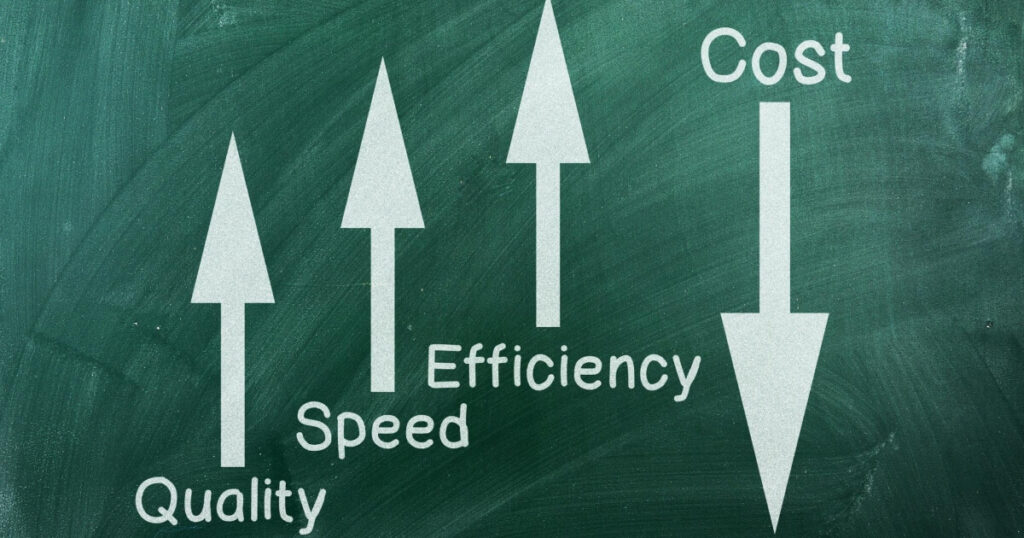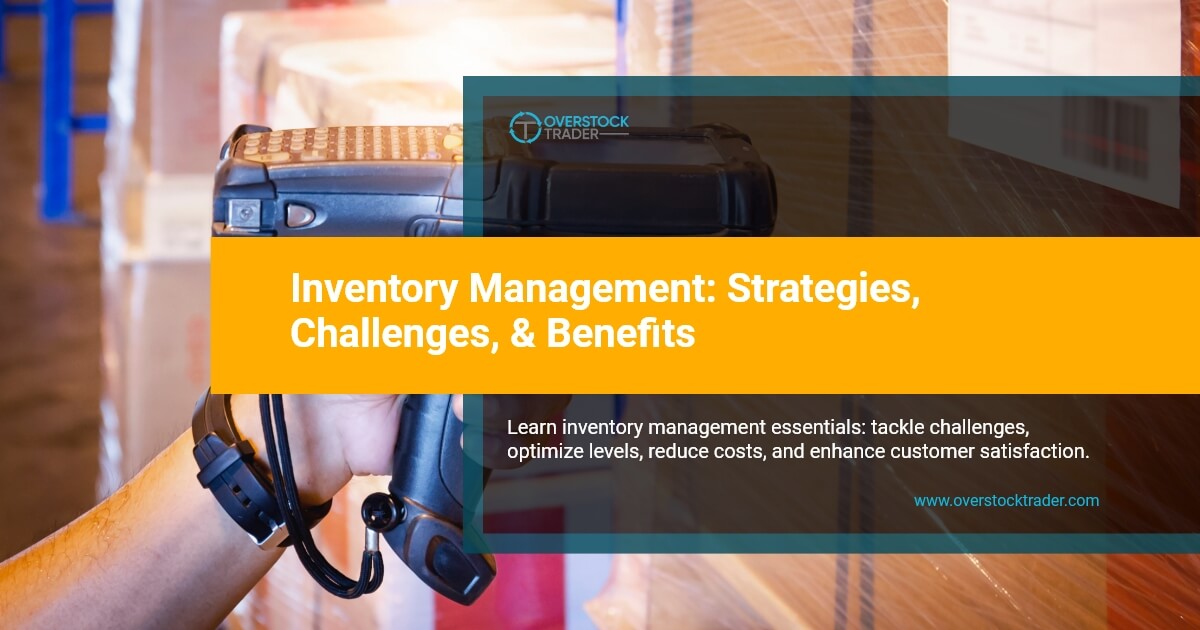Inventory management is crucial for businesses that make, distribute, or sell products. It involves keeping track of the goods that come from suppliers, go to warehouses, and are eventually sold to customers.
When done well, inventory management helps companies have the right amount of stock to meet customer needs without having too much excess inventory which has many costs including warehousing, insurance, and tied-up capital.
In this article, we’ll talk about the basics of inventory management and what it takes to do it well, including the challenges, benefits, and strategies.
What is Inventory Management?
Inventory management is like keeping things organized in a store. It’s about ordering, storing, and tracking what a company sells. The main goal is to have just enough inventory to successfully sell without having too much left over. This way, a company can meet customer needs and avoid spending too much on storage. But it’s tricky because sometimes it’s hard to know how much stuff to keep.
Challenges of Inventory Management
Inventory management can be tough for businesses. Here are some common challenges they may face:
Dynamic Demand Fluctuations
Inventory management presents a significant challenge due to the inherent unpredictability of customer demand. Despite businesses’ best efforts, no crystal balls are offering perfect forecasts. Consumer behaviors, market trends, and external factors can trigger swift and unforeseen shifts in demand. Consequently, accurately forecasting demand becomes a complex task, fraught with uncertainties.
Sometimes businesses end up with not enough stock, and other times they have too much. Both situations can cause problems for the company’s finances. In short, there’s no such thing as being a fortune teller in the realm of inventory management.
Supply Chain Disruptions
Dealing with inventory management challenges can be hard because supply chains today are complex. Businesses rely on suppliers from all over the world, and everything is connected.
Even with careful planning, it’s impossible to predict or plan for every problem that might come up. Things like natural disasters, political events, and transportation issues can cause delays and shortages, making inventory management difficult.
Product Lifecycle Variability
Managing inventory is a big challenge because the products a company sells have different lifecycles. Some items are always in demand, while others quickly go out of style or become less popular because of the season or changes in what people like. Consumer preferences evolve rapidly, making it essential for businesses to stay agile and responsive. Navigating this complexity requires strategic planning and adaptability. Companies must continuously assess market trends, anticipate changes in consumer preferences, and adjust their inventory management strategies accordingly. By staying attuned to shifting consumer behaviors, businesses can optimize their inventory levels and ensure they’re meeting customer demands effectively.
Cost Considerations
When it comes to managing inventory, there’s more to consider than just the direct holding costs like storage and insurance. The real challenge is understanding the hidden costs. Having too much inventory ties up money and can lead to unexpected costs.
On the other hand, not having enough inventory can mean missed sales and other problems. It’s important to find the right balance and consider both the obvious and hidden costs of holding inventory to keep the business financially stable.
Benefits of Effective Inventory Management
Now that we’ve delved into the complexities that make inventory management a formidable task, it’s crucial to shift our focus to the substantial benefits that stem from effective inventory management practices. The following are some key benefits of managing inventory effectively:
Improved Customer Satisfaction
Making customers happy is a major benefit of effective inventory management. When a business manages its inventory well, it can meet customer needs quickly and avoid running out of stock. This prevents customers from being disappointed and helps the business make more sales. When customers are satisfied, they are more likely to keep coming back and become loyal customers.
By aligning inventory with what customers want and using good management practices, businesses can make customers happy and build a loyal customer base, which is important in a competitive market.
Cost Reduction

Optimizing inventory levels is instrumental in minimizing carrying costs, storage expenses, and the risk of obsolescence, offering significant benefits to businesses. When businesses control their stock levels carefully, they can avoid having too much, which costs money to store. They also reduce the risk of stock becoming useless or expired, which would result in losses. By accurately understanding how much stock they need and adjusting accordingly, businesses can avoid expensive emergency shipments.
Better Decision-Making
Access to accurate inventory data is a cornerstone benefit of effective inventory management practices, empowering businesses to make informed decisions across various facets of their operations. With real-time and precise information on inventory levels, businesses can strategically plan procurement activities, ensuring that stock levels align seamlessly with demand forecasts.
This precision in decision-making results in more effective resource allocation, reducing the likelihood of excess or insufficient stock. Overall, the ability to leverage accurate inventory data translates into enhanced strategic decision-making, improving overall operational efficiency and contributing to sustained business success.
Strategies for Effective Inventory Management
Now that we’ve explored some of the significant benefits of effective inventory management, let’s delve into strategies that can help businesses improve their inventory management practices. The following are some key strategies that can contribute to better inventory management:
Utilize Technology
Using technology is an important strategy for effective inventory management. Businesses can invest in inventory management software and automation tools to make things easier. These technological solutions help streamline processes, keep track of inventory in real-time, and provide useful information.
Real-time tracking capabilities enable businesses to maintain accurate and up-to-date information on inventory levels, minimizing the risk of stockouts or overstock situations. Furthermore, these tools provide valuable insights through data analytics, helping businesses make informed decisions about procurement, pricing, and demand forecasting. In an increasingly competitive business environment, leveraging inventory management software and automation tools is not just a convenience but a strategic necessity, allowing companies to stay agile, responsive, and better positioned for long-term success.
Implement Demand Planning
Effective inventory management involves implementing demand planning strategies. By analyzing historical sales data and market trends, businesses can anticipate future demand and make informed decisions.
Historical data provides insights into customer preferences and market dynamics, while market trends help predict shifts in consumer behavior. Integrating these insights into demand forecasting techniques allows businesses to adjust inventory levels accordingly, preventing stockouts or overstock situations.
Building Relationships with Suppliers
Building good relationships with suppliers is an important strategy for managing inventory well. When businesses have strong partnerships with their suppliers, it helps the supply chain work smoothly. Trust and open communication are key in these relationships.
By working closely with suppliers, businesses can get better deals, like discounts or flexible payment options, which saves money. Having strong ties with suppliers also means shorter waiting times for deliveries, so the supply chain can respond quickly.
Want to know the value of your inventory?
Conclusion
Good inventory management is instrumental in safeguarding the financial health of a business by minimizing surplus and excess inventory. Maintaining an optimal level of inventory ensures that capital is not unnecessarily tied up in excess stock, thereby freeing up resources for investment in other areas of the business. By avoiding overstock situations, businesses can reduce carrying costs associated with storage, insurance, and depreciation. Ultimately, by minimizing surplus and excess inventory through proficient inventory management practices, businesses can improve cash flow, maximize profitability, and maintain a competitive edge in the marketplace.
By managing inventory well, businesses can keep operations running smoothly and increase profitability. When businesses have too much extra inventory, they can use inventory liquidation services like Overstock Trader to sell it off and turn it into cash. This helps them stay flexible and resilient in a changing market.
Frequently Asked Questions
Why is inventory management important for businesses?
Effective inventory management ensures that a company has the right amount of stock to meet customer demand without excess inventory tying up capital. It helps reduce costs, improve cash flow, and maintain customer satisfaction.
What is retail inventory management?
Retail inventory management focuses on managing inventory in retail businesses. It involves tracking inventory in real-time, optimizing stock levels, improving supply chain efficiency, and ensuring product availability to meet customer demand. Retail inventory management software is often used to streamline these processes.
Do I need inventory management software?
While not essential for every business, inventory management software can be a game-changer for many. It saves time, reduces errors, and gives you valuable insights into your inventory. If you struggle with manual tracking or have a complex inventory, software can be a worthwhile investment.

